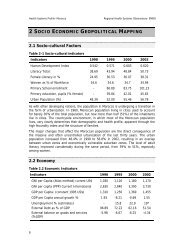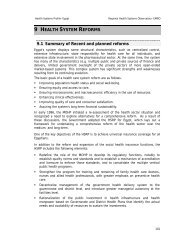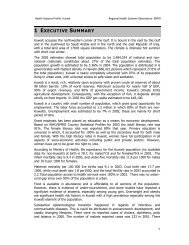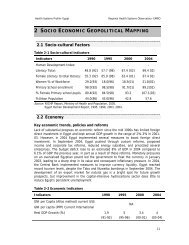The role of contractual arrangements in improving health sector ...
The role of contractual arrangements in improving health sector ...
The role of contractual arrangements in improving health sector ...
You also want an ePaper? Increase the reach of your titles
YUMPU automatically turns print PDFs into web optimized ePapers that Google loves.
• Advanced medical equipment <strong>of</strong> large<br />
hospitals.<br />
• Skilled technical workforce.<br />
• Good reputation outside Jordan, s<strong>in</strong>ce<br />
32% <strong>of</strong> hospital revenues are from<br />
foreign patients.<br />
• More quality services compared with<br />
government hospitals.<br />
Direct effect<br />
Outside environmental effect<br />
• Relations with other players <strong>in</strong> the <strong>sector</strong><br />
(public <strong>sector</strong>, <strong>in</strong>surance and<br />
pharmaceutical companies).<br />
• Mislead<strong>in</strong>g <strong>in</strong>formation regard<strong>in</strong>g the<br />
performance <strong>of</strong> private hospitals.<br />
• Laws and regulations that organize the<br />
<strong>sector</strong> with related parties.<br />
• Low <strong>in</strong>come levels per capita.<br />
• Potential competition.<br />
Jordan<br />
Jordanian private hospitals<br />
• Inefficient <strong>role</strong> for the Private Hospitals Association.<br />
• Cash flow problems.<br />
• Shortage <strong>in</strong> qualified nurses.<br />
• Less advanced equipment for the small hospitals<br />
compared with large hospitals.<br />
• Excess capacity and overlapp<strong>in</strong>g <strong>in</strong> certa<strong>in</strong> medical<br />
equipment and services.<br />
• <strong>The</strong> bed occupancy rates are low (44%) compared with<br />
other <strong>health</strong> services providers.<br />
• Lack <strong>of</strong> skilled management expertise.<br />
• Inefficient cooperation with<strong>in</strong> the <strong>sector</strong>.<br />
Source: Adapted from Deloitte & Touché (M.E.) “F<strong>in</strong>ancial and Regulatory Study <strong>of</strong> Jordanian Private Hospitals”,<br />
2001.<br />
Figure 1. Strategic analysis <strong>of</strong> the private hospital <strong>sector</strong> <strong>in</strong> Jordan<br />
122<br />
Direct effect<br />
Outside environmental effect<br />
• Privatization <strong>of</strong> public <strong>in</strong>stitution creates<br />
additional demand on private hospital <strong>sector</strong>.<br />
• <strong>The</strong> Higher Health Council, headed by the<br />
Prime M<strong>in</strong>ister, is determ<strong>in</strong>ed to regulate the<br />
hospital <strong>sector</strong> to ma<strong>in</strong>ta<strong>in</strong> its competence and<br />
excellence on the regional level.<br />
• <strong>The</strong> implementation <strong>of</strong> a national <strong>health</strong><br />
<strong>in</strong>surance plan is expected to <strong>in</strong>crease demand<br />
on <strong>health</strong> care services, which will directly<br />
<strong>in</strong>fluence the performance <strong>of</strong> private<br />
hospitals.<br />
• Investment <strong>in</strong>centives and tax exemptions.
















